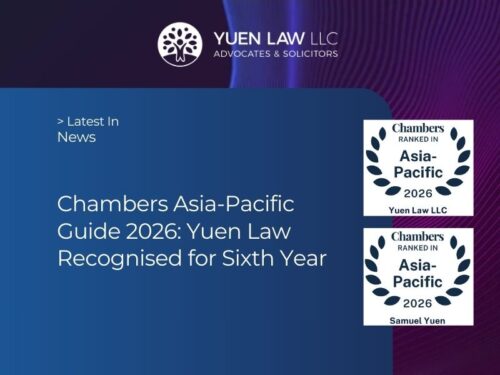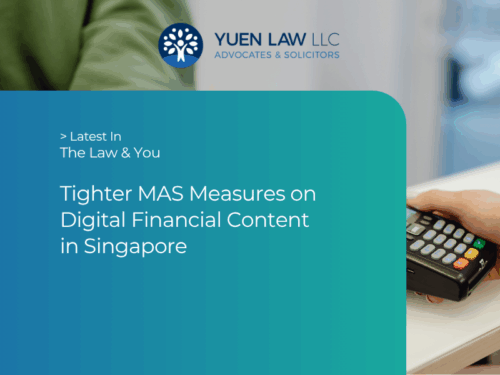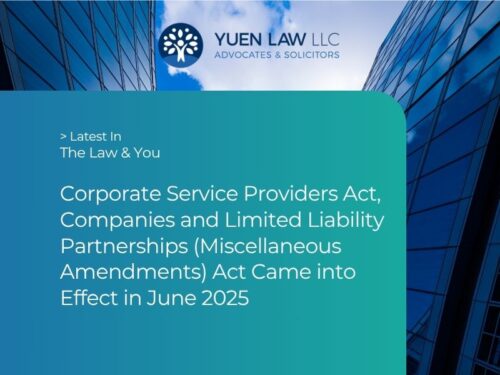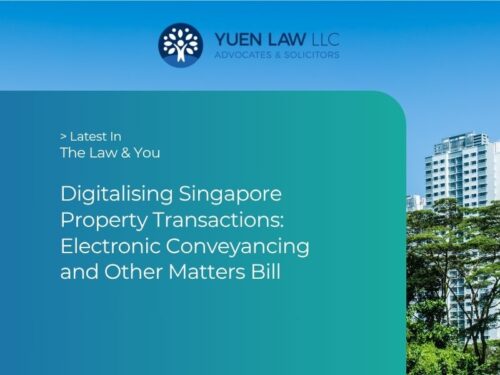Table of Contents
Post-Divorce Transfer of Property
The division of assets is a significant aspect of any divorce. However many people assume that the order is sufficient, and overlook what needs to be done to complete a property transfer or sale after a divorce court order is issued. This is especially so when communication between the couple has broken down.
This article outlines key considerations for post-divorce property transfers and the role of a conveyancing lawyer in facilitating the transfer, and the process.
When to Appoint a Conveyancing Lawyer?
A divorce court order is necessary but not sufficient to effect a transfer of property ownership. The order itself does not automatically update the ownership of a property, and parties must take further action to update the necessary authorities, including the Housing Development Board (HDB) and the Singapore Land Authority (SLA).
Divorce court orders typically provide that property transfers or sales to be completed within six months of the date of issuance.
Oftentimes, parties leave it to the very last moment to engage lawyers to effect the transfer, such that the deadline passes and no transfer is effected. It is advisable to engage a conveyancing lawyer as soon as the divorce court order is issued, as the transfer process can take anywhere from one to two months for private properties and three to five months for HDB flats.
Note: While HDB provides legal services for buying and selling HDB flats, HDB may require you to engage your own lawyers where the transfer or sale is pursuant to a court order.
What to Do if the Property Transfer Deadline in My Divorce Court Order has Passed
If the time frame for transferring the property under your divorce court order has expired or is close to expiring, you should act quickly. We can still assist with the transfer or part-resale, but it is important to be aware that HDB or SLA has the discretion to request that you seek a variation to the divorce court order before updating the ownership records.
If the time frame has long expired, you will need to apply to court for an extension of time to complete the transfer or part re-sale. We will work closely with our family lawyers in filing the necessary application and explaining to the Court any reasons for the delay, such as financing issues or difficulties in coordinating with the other party.
What can I do if my ex-spouse is unwilling to sign the transfer or part-sale documents?
Even in an amicable divorce, one party may still try to interfere with the transfer or part-sale of the property after the court has issued its divorce order. We have assisted in cases where an ex-spouse refused to sign the necessary documents for a variety of reasons (be it disputing the division of proceeds or to continue living in the matrimonial home)—.
If you are facing a similar situation, we can apply to amend the court order to authorize the Registrar of the Family Justice Court to sign the transfer documents on your behalf, ensuring that the transaction can proceed.
Process of Property Transfer or Part-Sale Pursuant to Divorce Court Order
Step 1: Engage a Conveyancing Lawyer
The first step is to appoint a conveyancing lawyer and provide us with a copy of your divorce court order. This allows us to understand the terms of the transfer or sale process. We will ensure that all necessary documentation is prepared and executed in accordance with the law.
Step 2: Conduct Title Search
We will conduct a title search with the Singapore Land Authority (SLA) or HDB to verify property ownership and identify any existing mortgages.
Step 3: Retaining Party to Obtain Financing
If there is an outstanding mortgage, it must be redeemed before proceeding with the transfer or sale. The retaining party must secure financing, if necessary, either through a bank loan or an HDB loan. For HDB flats, if the retaining party requires an HDB loan, they must apply for the HDB Loan Eligibility (HLE) letter.
Step 4: Prepare and Execute Legal Documents
We will prepare the necessary legal documents, including the Transfer Instrument for a transfer or the Option to Purchase and related documents for a part-resale or sale. Both parties must execute these documents. For HDB properties, we will guide parties on how to request a transfer of ownership (not through sale) on the HDB portal using their Singpass.
Step 5: Complete Financial Transactions
We will liaise with the relevant authorities to process any CPF refunds and arrange for the payment of related fees. At this stage, any agreed-upon cash payments to the outgoing party will be made, and CPF refunds or top-ups will be processed.
Step 6: Lodge the Transfer with SLA or HDB
We will lodge the transfer documents with the SLA (for private properties) or HDB (for HDB flats). Once registered, the property ownership records will be officially updated, and new title deeds will be issued.

Key Considerations for Property Transfers in Divorce Proceedings
This section outlines the key issues that couples should discuss and agree on when finalising the terms of their divorce, particularly in relation to the division of their matrimonial properties.
Option 1: One Party Transfers or Buys the Other Party’s Share of the Property
Eligibility to Retain Property
The first step is determining which party will retain the property. If the property is an HDB flat, the retaining party must check whether they meet the HDB eligibility conditions for flat ownership. Proposed owners and occupiers must meet specific eligibility criteria, such as:
- Divorcees with children under their legal custody, care, and control.
- Singles who are at least 35 years old.
Additionally, if the retaining party is a Singapore Permanent Resident (SPR), they must have at least one Singapore Citizen or another SPR as a co-owner or occupier.
Financing the Property
If there is an existing mortgage on the property, the loan must be fully redeemed before any transfer or part-resale can proceed. The retaining party must also assess whether they can afford to take over the property. If financing is required, they must apply for the necessary loan, and if they plan to take out an HDB loan, they will need to apply for the HDB Loan Eligibility (HLE) letter.
Central Provident Fund (CPF) Refunds
If the outgoing party used CPF funds for the property, both parties should check the CPF accounts to confirm the exact amount used by the outgoing party. During the divorce proceedings, it is crucial to specify in the divorce order whether there will be a full refund, partial refund, or no refund to the outgoing party.
If a full refund is required, the CPF Board will expect a return of the total principal amount withdrawn, along with any accrued interest.
If a partial refund is required, the remaining owner must make a partial refund to the outgoing party’s CPF account. If the remaining owner has insufficient CPF funds to complete the refund, they will need to top up the shortfall with cash.
If no refund is made to the outgoing party’s CPF account during the property transfer, the CPF funds used by the outgoing party will belong solely to the remaining owner. When the remaining owner later sells the property, they must refund both their own CPF funds and the CPF funds previously used by the outgoing party back into their own CPF account.
Cash Considerations & Stamp Duty
If the retaining party agrees to pay a sum of money to the outgoing party, stamp duty will apply in the case of a part-share resale. It is important to note that CPF funds cannot be used to pay the cash consideration. For situations where no cash consideration is involved, parties may transfer their title and interest in the property (other than by way of sale) and apply for a remission of stamp duty.
How parties arrive at the sum could take into consideration the contributions of each party (both financial and non-financial contributions to the marriage and acquisition of the property.
Incidental Costs for the Transfer or Part-Sale
The divorce court order must specify who will bear the costs related to the part-share sale or transfer. These costs may include legal fees, the HDB resale levy, and any applicable stamp duties.
Option 2: Property is Sold on the Open Market or Surrendered to HDB
In cases where neither spouse wishes to retain the property, the property will be sold on the open market. For HDB flats, if the minimum occupation period or eligibility conditions for proposed flat owners are not met, the property will need to be surrendered to HDB.
Surrendering to HDB
If there are any financial losses incurred from the surrender, it shall be apportioned between the parties in accordance with the prevailing HDB and CPF rules and regulations. This includes any outstanding mortgage balances, CPF refunds, or other related costs. It is essential that this provision is clearly outlined in the divorce court order to avoid any confusion or disputes.
Conduct of Sale in the Open Market
If the property is to be sold on the open market, another key consideration is who will have the responsibility for conducting the sale. The parties need to decide whether one party will take sole control of the sale process or if both parties will jointly handle the sale. This should be agreed upon to ensure smooth coordination during the sale.
Distribution of Sales Proceeds
The parties must determine how the sale proceeds will be distributed, including payments to third parties such as the mortgagor, HDB resale levy, CPF, and legal fees. If there are remaining proceeds, the court order should specify how these will be divided between the parties.
CPF Refunds
Both parties should review their CPF accounts to determine the amount used for the property purchase. During the divorce proceedings, it is important to specify in the divorce order whether there will be a full refund, partial refund or no refund.
If a full refund is required, the CPF Board will expect the return of all principal amounts withdrawn, along with the accrued interest.
A partial refund may be allowed where there are insufficient funds to make full refund in the event of a negative sale. The CPF Board may waive the shortfall, provided that the sale is done at fair market value and no cash proceeds were received by the seller.
No refund may be allowed in limited cases, such as when the seller is above CPF withdrawal age and has met the Full Retirement Sum in their Retirement Account.
Incidental Costs for the Surrender or Sale
It is important to clearly define who will bear the incidental costs related to the HDB surrender or sale. This includes costs such as legal fees, HDB resale levy, and stamp duty, if applicable. The divorce court order should specify how these costs will be allocated to avoid confusion later on.
FAQ
What happens to my property after divorce?
Properties that are part of the matrimonial pool of assets will be divided during the divorce.
For HDB properties, if one party wishes to retain the flat, they must meet the HDB eligibility conditions. If the minimum occupation period (MOP) for the HDB has not been met, the couple will need to surrender the HDB after the divorce.
How are the proceeds from the sale of the property divided?
The division of matrimonial assets is determined during the divorce proceedings, considering both direct (financial) and indirect (non-financial, such as caregiving responsibilities) contributions made by each party during the marriage.
Is cash payment to the transferor a must?
This is also addressed during the divorce proceedings. If both parties agree that no payment is necessary, the flat can be transferred (not through sale). In such cases, they may apply for a remission of stamp duty.
What happens if my spouse is not agreeable to the sale or transfer of property?
During divorce proceedings, the court will direct both parties to attend mediation to facilitate a resolution. If an agreement cannot be reached, the case will proceed to trial, where a Family Justice Court judge will determine how the matrimonial assets should be divided during the ancillary matters hearing.
If the court orders the transfer or sale of the property but the other party refuses to sign the necessary documents, our family lawyers can apply to amend the court order to allow the Registrar of the Family Justice Court to sign the documents on their behalf, ensuring the transaction proceeds as ordered.
Can parties use the same lawyer for the transfer or part-resale?
For HDB properties, both parties may appoint our firm to handle the transfer or part-resale.
For private properties, both parties may use the same lawyer, but this is subject to the bank’s approval. The borrower will need to request the bank’s consent, and the bank has the discretion to approve or deny the request.
Will I be liable for making mortgage payments pending the transfer?
Yes, until the transfer is completed, all existing financial obligations—including mortgage payments—remain the responsibility of the party or parties listed as borrowers on the loan. This applies even if you have already agreed to transfer the property to your ex-spouse.
If both parties are co-borrowers, the bank or financial institution will continue to hold both parties accountable for repayments until the loan is refinanced or settled. If one party stops making payments, the other may have to cover the full amount to avoid penalties or legal action from the lender.






